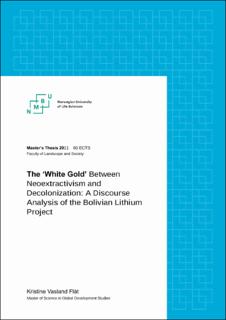| dc.contributor.advisor | Leifsen, Esben | |
| dc.contributor.advisor | Vangsnes, Gard Frækaland | |
| dc.contributor.author | Flåt, Kristine Vasland | |
| dc.coverage.spatial | Bolivia | en_US |
| dc.date.accessioned | 2021-11-30T14:04:47Z | |
| dc.date.available | 2021-11-30T14:04:47Z | |
| dc.date.issued | 2021 | |
| dc.identifier.uri | https://hdl.handle.net/11250/2832158 | |
| dc.description.abstract | The pressuring need for a sustainable energy transition has increased the global demand for lithium-ion batteries used in electric vehicles. The earth’s single largest deposit of lithium is located in Bolivia, and the Bolivian government has made an ambitious plan to industrialize the sector and control the value-chain. Through a discourse analysis of a broad range of policy documents and interviews with key informants, I discuss the differences between neo-extractivist and neoliberal policies and assess to what extent the Bolivian lithium project can be considered decolonial. In order to assess this, I draw upon the works of Latin American decolonial scholars, along with debates of the Indigenous notion of Vivir Bien/Good Living. My findings suggest that although the current Bolivian government positions itself in clear opposition to neoliberalism, capitalism and colonialism, there are substantial challenges related to the persisting colonial patterns of dependency and uneven power structures. I argue that this has led to a continuation of unresolved tensions, and that there is a clear conflict between discourse and practice in the context of Bolivian politics. I conclude that the lithium project differs substantially from neoliberal approaches to natural resource management, and that it can be considered decolonial in the sense of resource sovereignty through its ambitions to capture and control revenue streams. It fails however, to engage with a broader set of decolonial arguments and thus, partly reproduces historical colonial power structures. | en_US |
| dc.language.iso | eng | en_US |
| dc.publisher | Norwegian University of Life Sciences, Ås | en_US |
| dc.rights | Attribution-NonCommercial-NoDerivatives 4.0 Internasjonal | * |
| dc.rights.uri | http://creativecommons.org/licenses/by-nc-nd/4.0/deed.no | * |
| dc.subject | Lithium | en_US |
| dc.subject | Indigenous people | en_US |
| dc.subject | Natural resource governance | en_US |
| dc.subject | Neoextractivism | en_US |
| dc.subject | Decolonization | en_US |
| dc.subject | Resource sovereignty | en_US |
| dc.title | The ‘White Gold’ between neoextractivism and decolonization : a discourse analysis of the Bolivian lithium project | en_US |
| dc.type | Master thesis | en_US |
| dc.description.localcode | M-DS | en_US |

